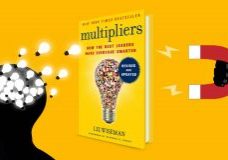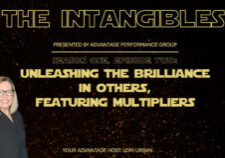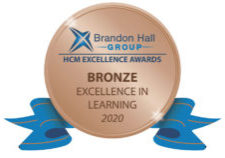Are you getting ALL the intelligence of your employees?
One kind of leader typically realizes only 45%. Could it be you?
 Low-hanging fruit
Low-hanging fruit
A common maxim in business is that it is up to seven times more expensive to get a new customer than to retain and grow the ones you already have. The same principle is at work in the market for talent — the least costly, most accessible intelligence to accelerate your business is already present in your people. Advantage thought leader partner BTS has teamed up with Liz Wiseman, author of the bestselling book Multipliers – How the Best Leaders Make Everyone Smarter, to create a powerful simulation learning experience that helps leaders access all of the intelligence of their teams.
What kind of leaders get the most intelligence from their teams?
Think about a leader with whom you have done the best work of your life. What did that leader do? Why did they get so much more of your intelligence than other leaders?
Liz Wiseman set out to answer the question: "Why are we smarter and more capable around some leaders but not others?" In her research, Wiseman uncovered patterns of behaviors and underlying beliefs that differentiated multiplying leaders, who got the most intelligence from their teams, and diminishing leaders, who often got only half of the reported intelligence from their people.
It is important to distinguish here between intelligence contribution, the subject of the Multipliers research, and general engagement or effort. Many participants report working hard under diminishing leaders, but not in a way that fully leverages their intelligence. Diminishing leaders often engage the hearts and hands of those they lead, just not their head.
BTS has conducted our own research on the impact of multiplying and diminishing leaders, surveying hundreds of participants across multiple clients and industries, at levels from individual contributors to senior executives and CEOs.
Our results mirror Wiseman's:
- Regardless of industry, level, or role, participants report an extraordinarily consistent set of behaviors from the leaders who got the most intelligence from them, and a contrasting set of behaviors from the leaders who tended to inhibit their intelligence contribution. These behaviors are highly aligned to the Multiplier and Diminisher behaviors from Multipliers.
- Multiplying leader behaviors express a belief that people are smart and can figure things out. Diminishing leader behaviors express a belief that the team cannot succeed without strong oversight from the leader.
- Participants report that, under diminishing leaders, they accessed about 45% of their potential intelligence. Under multiplying leaders, they accessed 96%. An interesting note - many participants have insisted on a value above the 100% scale, as the multiplying leader accessed intelligence the participants were not even aware they possessed.
- Every participant was able to identify both multiplying and diminishing leaders in their past and present work environments.
The implications of the Multipliers research are profound. Diminishing leaders realize less than half of their team's potential intelligence, which reinforces their belief in the limited abilities of the team. The team picks up on their leader's belief, and the outcome is a vicious cycle of low expectations breeding low performance. Both the diminishing leader and their team thus contribute far less than their potential intelligence to the business.
Multiplying leaders, including those who were formerly diminishers, experience a virtuous cycle of high expectations and empowerment. This leads to team growth, and it reinforces both the leader's and the team's belief that the team members are smart and capable. Participants working under multiplying leaders report:
- High levels of innovation and experimentation.
- Agility and fluidity within the team, confidence and empowerment working across teams (especially in matrixed team environments).
- Small teams outperforming larger teams across a variety of metrics.
The Good News
Liz Wiseman’s research shows that diminishing leaders can learn to become highly effective Multipliers. BTS has teamed up with the Wiseman Group to accelerate that learning through a powerful simulation experience now available from Advantage Performance Group.
Read more about how BTS worked in close collaboration with Wiseman to develop leadership scenarios drawn from her research to create a practical, unique learning experience in our related white paper.
The Multipliers Simulation
When does 1+1=3? When a groundbreaking book becomes a powerful simulation. Find out more about the Multipliers simulation and why Multipliers author Liz Wiseman believes it's a powerful way to help teams bring their best work to an organization.
Multiplier leaders get more intelligence from their teams than their Diminisher counterparts do—in fact, over twice as much.
Related articles
- Transforming AI adoption through sponsored experimentation - September 3, 2024
- Navigating AI disruption to revolutionize work and customer value - July 8, 2024
- Are you getting ALL the intelligence of your employees? - April 22, 2016












